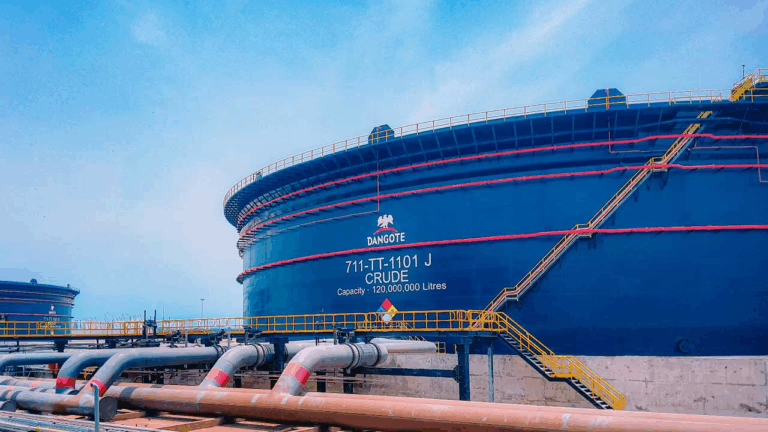Nigeria’s energy landscape is undergoing a profound shift once deemed unattainable, now emerging as a cornerstone for the nation’s future prosperity. With the Dangote Refinery fully operational, Nigeria stands at a pivotal moment, poised to achieve energy self-reliance and sustainable stability for the first time in decades.
This refinery is far from a typical industrial venture. Its vast capacity and scope position it as a transformative force for the domestic economy. Beyond producing petrol and diesel, it generates essential by-products such as sulphur, carbon black, polypropylene, and butane. These materials serve as fundamental inputs for diverse industries including tire manufacturing, ink production, fertilizers, plastics, and packaging. The ripple effect is significant: the refinery not only addresses energy challenges but also lays the groundwork for Nigeria to broaden its industrial sectors, create employment opportunities, and retain billions of dollars previously lost to imports.
However, history teaches us that entrenched interests rarely relinquish control without resistance. Proposals for new oversight committees, often framed as measures for transparency, risk becoming tools for those who benefited from past inefficiencies. Nigeria must break free from this cycle. The refinery deserves protection from politicization and interference.
For years, Nigeria’s fuel supply chain was dominated by import dependence, fostering subsidy exploitation, rent-seeking behaviors, and systemic distortions. Depot operators and influential groups like DAPPMAN thrived under this model. At its peak, this system facilitated billions in dubious subsidy claims while leaving consumers with inconsistent fuel availability, long queues, and inflated prices. Some defend depots as vital employment hubs, yet the reality is stark: a typical depot employs only a few workers, whereas a single filling station supports dozens. Clinging to this outdated system is, at best, misguided and, at worst, self-serving.
The economic landscape is evolving rapidly. Nigeria boasts over four million metric tons of storage capacity, much of which remains underutilized. With a domestic refinery now producing at scale, the traditional import-and-store approach is not only inefficient but obsolete. Globally, similar trends have unfolded: storage depots in cities like Rotterdam or Singapore were designed for export-driven economies, not for nations refining and consuming fuel locally. The lesson is clear-rising local production renders import-dependent infrastructure redundant.
A parallel can be drawn with Nigeria’s cement sector. As local cement manufacturing expanded, the fleet of bulk import carriers was phased out or sold, dismantling an entire ecosystem that profited from imports and paving the way for a robust domestic industry. The fuel sector is on a similar trajectory, and resisting this evolution only postpones the inevitable.
Crucially, the Dangote Refinery is more than a step toward energy independence; it is revolutionizing the downstream supply chain. Investments are underway to introduce a modern fleet of fuel-efficient trucks, replacing the aging, polluting tankers that have long plagued Nigerian roads. This modernization is vital for enhancing operational efficiency and environmental sustainability. It signals a comprehensive overhaul of the logistics network, aiming for safer, cleaner, and more dependable fuel distribution.
Opposition from vested interests tied to imports, subsidies, and opaque privileges is expected. Yet, Nigeria cannot afford another cycle of rent-seeking that stifles reform. The nation has forfeited too many chances due to entrenched resistance. Depot owners and legacy operators must evolve by channeling investments into retail networks, petrochemical ventures, or emerging sectors like lubricants, plastics, and renewable energy. Some might even consider revitalizing dormant state refineries to foster genuine competition. What cannot continue is the attempt to halt progress or undermine a facility with immense potential for economic growth.
The Dangote Refinery stands as a solution, not a problem. It offers a foundation for industrial expansion, job creation across new industries, and insulation from the volatility of global fuel markets. Additionally, it strengthens Nigeria’s fiscal health by curbing foreign exchange outflows and opens avenues for exports within West Africa. The regional impact is equally significant: a stable, energy-secure Nigeria benefits neighboring countries and reinforces its leadership role across the continent.
For everyday Nigerians, the advantages are concrete: consistent fuel availability, prospects for lower long-term fuel costs, and the emergence of new industries fueled by refinery by-products, generating thousands of jobs. True energy security means more than just avoiding shortages-it means unlocking new economic opportunities.
Undermining this critical asset through political maneuvering, sabotage, or misguided regulations would squander private investment and derail national progress. The Dangote Refinery represents a high-stakes, timely breakthrough. Nigeria cannot afford to let cynicism or vested interests derail what may be its most significant industrial achievement in a generation.
Past delays in capitalizing on opportunities-such as in iron and steel production, aluminum smelting, petrochemicals, and textiles-must not be repeated. Safeguarding the refinery transcends protecting a single investment; it is about securing Nigeria’s energy future, revitalizing its industrial foundation, and turning the long-awaited promise of self-sufficiency into reality.






















